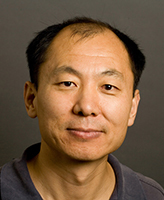
Structural equation modeling and factor analysis might be difficult concepts to grasp for most people outside the world of statistics, but one thing should be crystal clear: Professor Ke-Hai Yuan’s groundbreaking work in these areas is a driving force behind the nationally recognized success of the quantitative psychology program in Notre Dame’s College of Arts and Letters.
“Ke-Hai is one of the most brilliant statisticians in a generation, and one of the most productive,” says Dan Lapsley, professor and chair of the Department of Psychology. “What is astonishing is the range of topics where he has made a difference. I can’t think of single topic in quantitative psychology that has not benefitted from Ke-Hai’s scholarship.”
Yuan has published more than 100 papers in the most prestigious journals in the field (including 10 in the esteemed Psychometrika jornal — more than any other scholar), and routinely contributes more than 15 articles a year.
“Very rarely can you find someone who publishes so extensively,” says Alison Cheng, an assistant psychology professor at Notre Dame. “One of his distinct contributions is on the development of original methodology without making unrealistic assumptions about the distribution of real data.”
Complex Questions
Yuan’s innovative methodologies help scientists make more accurate conclusions from data such as surveys, tests, and questionnaires, according to Peter Bentler, distinguished professor of psychology and statistics at the University of California, Los Angeles.
Bentler explains: “A scientist who thinks up the problem may design the study and gather the data; the person who analyzes the data is often an applied statistician. When the applied statistician runs into a difficult problem, he turns to a theoretical statistician to come up with a more justifiable or accurate mathematical approach. Ke-Hai is such a theoretical statistician, and being in psychology, he is concerned especially with the type of data psychologists, educators, and other social scientists might gather.
“The main import of Ke-Hai’s work is that he can provide methods to deal with important but complicated questions in situations where standard methods may break down.”
In fact, Yuan’s contributions often open up new possibilities for fellow researchers to investigate, says Notre Dame colleague Scott Maxwell, Matthew A. Fitzsimons Professor of Psychology.
“Some people mistakenly think that statistics is about nothing more than how to analyze the data, but in reality methodology is also a driving force in affecting the types of questions psychologists study,” he says. “Innovative methodological advances allow clinical, cognitive, and developmental psychologists to ask new questions that otherwise might not have occurred to them. Or even if the questions occurred to them, they might have had no way to answer them.”
Variety of Fields
Yuan’s work impacts multiple areas that concern researchers such as missing data, statistical theory of sampling error, item response theory, and latent variable methods, including factor analysis and structural equation modeling.
With sampling error, for example, Yuan’s methods are used to address a number of common challenges, including various quantities that require estimation, variables that may have large errors of measurement, and irrelevant influences that may need to be controlled, Bentler says.
In the field of item response theory, Yuan’s work supports the movement towards computerized adaptive testing in which an individual’s response to one question largely determines the next question. Yuan’s methods are designed to improve the accuracy of the testing.
In summary, all of Yuan’s work has at least three characteristics, Bentler says.
“First, it impacts a wide variety of fields requiring different mathematical methods; second, it combines very careful analysis and proof along with computer simulations to verify that his methods actually work in practice as they should; and third, his methods are typically applied to large data sets with many variables and many responses that may have complex structures, may involve hypotheses about a variety of unmeasured constructs, and may have anomalies that provide a challenge for correct analysis.”
Generous Spirit
In addition to his field-expanding research, Yuan’s willingness to collaborate with others in the quantitative psychology program, including junior faculty, is equally noteworthy, Lapsley, Cheng, and Maxwell agree.
“What I most appreciate about him is his generosity as a colleague,” Lapsley says. “One would think that approaching someone of his stature would be intimidating to doctoral students or faculty alike. Yet he is extraordinarily helpful and encouraging to everyone in the department. Our collective research is better, more sophisticated and better understood when Ke-Hai weighs in to help with design, method, and especially analysis.”
Yuan says that he, in turn, appreciates the support of the department.
“It is a joy to witness the development of the program,” he says. “The welcoming and collegial atmosphere makes Haggar Hall a pleasant place to work. The whole department is like a big family, and I can get good advice from colleagues on either academic or personal matters.”
Notre Dame’s Department of Psychology is a leading program because it has many strong and nationally visible senior faculty, and younger faculty who are beginning to make their mark, Lapsley says.
“But Ke-Hai has set the pace. He redeems our ambition to be a top-ranked psychology department, and makes possible Notre Dame’s ambition for excellence in scholarship and graduate education.”


